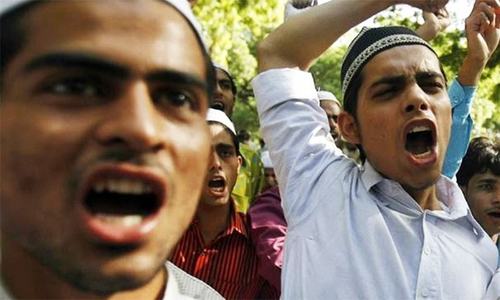In BJP's India, a call to demolish Jinnah's house in Mumbai

A Bharatiya Janata Party (BJP) lawmaker, Mangal Prabhat Lodha, on Monday demanded that a residence owned by Mohammad Ali Jinnah in Mumbai be demolished and that a cultural centre be built in its place, Times of India reported.
Lodha, who is a property magnate in Mumbai, was speaking at the Legislative Assembly on budgetary demands when he said: "The Jinnah residence in south Mumbai was the place from where the conspiracy of partition was hatched."
"Jinnah House is a symbol of the partition. The structure should be demolished," he said.
Lodha, who is a member of India's legislative assembly (MLA), claimed that the Public Works Department has to pay hundreds and thousands of Indian rupees just for the iconic building's upkeep and maintenance.
"The structure should be demolished and a cultural centre highlighting Maharashtra's culture and pride should be built. The cultural centre should also exhibit the glorious history of India," Lodha said.
The demand was made by the BJP member in the wake of the Indian Parliament passing the controversial amendments to the Enemy Property Act 1968 earlier this month.
Enemy Property
As per the Enemy Property Act, successors of those who migrated to Pakistan from India or China during the partition will have no claim over the properties left in India. However, Jinnah's house in Mumbai, formally named South Court, is categorised as an "evacuee property" and not an "enemy property".
According to the Evacuee Property Act, 1950, an evacuee is a person who left India by March 1, 1947 on account of setting up of the dominions of Pakistan and India or due to civil disturbances or fear of such disturbances.
Dina Wadia, Mohammad Ali Jinnah's only child, has been embroiled in litigation regarding the ownership of the house for the past many years. In 2010, the then 90-year old offspring of Pakistan's founding father moved the Indian High Court laying claim to the multi-million dollar mansion as his "only daughter and sole heir".
Initially, Wadia fought the case against the Indian government, but a petition by a third party was filed by Jinnah's grand-nephew Mohammed Ebrahim and his son, claiming their stake to the property by citing Islamic Law which states that they were the legal heirs of Fatimah Jinnah and therefore entitled to the property.
The case remains to be solved and South Court continues to remain under the Indian government's ownership.











































